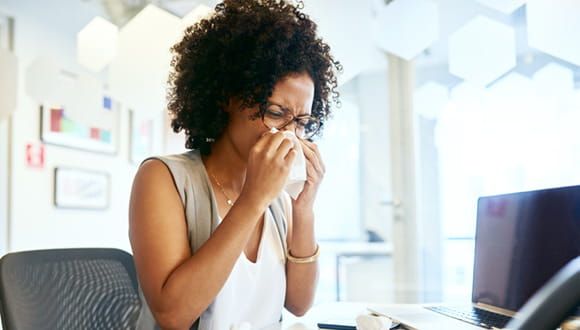Your first thought when your feel an itch or tickle at the back of your throat is likely: Is it COVID-19 or allergies?
Seasonal allergies can certainly leave you feeling crummy — sometimes really crummy. One silver lining, though, is that, unlike COVID-19, allergies are not contagious. It's one big reason knowing which of the two conditions that you have matters.
Another is that the two are managed fairly differently.
"COVID-19 affects everyone differently, but it's typically an acute illness that lasts anywhere from a few days to weeks," says Dr. Omar Ahmed, an ENT doctor at Houston Methodist. "People who are high risk for severe disease may need prescription medications. For mild cases, though, a person might not any need treatment beyond getting plenty of rest. Seasonal allergies, on the other hand, can persist for months if not treated properly."
That's because plant pollens, not a virus, are what most often cause seasonal allergies. In the spring, this means tree pollen, which can start dropping as early as February and continue to wreak havoc for allergy sufferers through May.
(Related: 5 Tips for Avoiding Seasonal Allergy Symptoms)
What makes matters worse is that certain seasonal allergy symptoms can overlap with ones you might expect from COVID-19, including fatigue, nasal congestion, headaches, a runny nose and even mild shortness of breath. This means it can be tricky for you to determine which it might be.
Signs that can help you decide if you have seasonal allergies
Given the potential for overlapping symptoms, there's some initial investigative work you'll need to do. Take note of your symptoms and look out for the ones that signal it's likely seasonal allergies, including:
1. Watery, swollen eyes
"Seasonal allergies are an immune response to an environmental trigger, usually some type of pollen," says Dr. Ahmed. "This response includes the release of histamine, which contributes to the watery, swollen, red and even itchy eyes a person experiences with allergies."
He adds that watery, swollen eyes aren't as common during an upper respiratory viral infection like COVID-19.
2. An itchy, scratchy (but not sore) throat
"This immune response to the allergen can also cause itchiness in your throat," says Dr. Ahmed. "Itchiness seems to be a trademark of allergies, certainly more so than with an infection."
Typically, people with allergies report having an itchy, scratchy throat — but no actual pain.
"A sore throat, on the other hand, might be a sign of COVID-19, a cold or even the flu, depending on the season," adds Dr. Ahmed.
3. Lack of fever
"A fever can be a sign of infection, but not allergies," says Dr. Ahmed. "COVID-19 doesn't always cause fever, but it can. As can the flu. Allergies do not cause fever."
This means that the lack of a fever could signal allergies.
Conversely, having a temperature of 100º F or higher is a clear sign it's not allergies.
4. Your symptoms are the worst after being outdoors
Allergy symptoms can be bothersome 24/7, but the timing of when they're the worst can be a clue.
"If you're sneezing and reaching for the tissues more after being outdoors or on a high pollen day, it's a sign it could be allergies," says Dr. Ahmed. "Additionally, pollen counts are typically highest in the mornings. So allergy sufferers may notice their worst symptoms at that time."
How to get rid of allergies
If all signs point to allergies, it's time to start your treatment regimen. And Dr. Ahmed's preferred first step might surprise you.
"The most important thing is to use a saline nasal rinse," Dr. Ahmed recommends. "This helps wash away the pollen particles that have deposited in your nose."
He adds that taking an antihistamine can help lessen some allergy symptoms, like itchy eyes, sneezing, a scratchy throat and a runny or stuffy nose.
"You may also consider starting a steroid nasal spray," Dr. Ahmed explains. "These sprays take a few days to take effect but can be taken daily to continue to relieve symptoms throughout the season."
Still worried it might be COVID-19? There's a test for that
If you suspect you might have COVID-19, the best course of action is to get tested.
While at-home COVID-19 tests can be a convenient way of establishing a positive diagnosis, know that they work best early in the course of the disease.
And if you're having symptoms, a negative result should still be confirmed by a PCR test at your local clinic. The instructions provided in most at-home rapid antigen tests will include this guidance.
Need care now?
Houston Methodist Virtual Urgent Care offers on-demand video visits from wherever you are, no appointment needed. Our board-certified providers are available 24/7 to address many common health issues.








